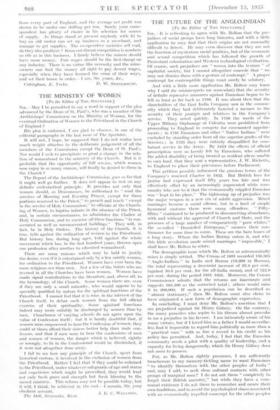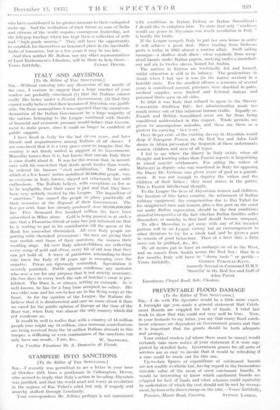THE FUTURE OF THE ANGLO-INDIAN [To the. Editor of THE
SPECTATOR.] SIR,—It is refreshing to agree with Mr. Bolton-that the pre- judices of social groups have long histories, and with a little application he may find that their origins are not unusually difficult to detect. He may even discover that they are not the function of mysterious racial qualities, but of the economic and sexual competition which has followed the growth of Protestant colonisation and Western technological civilisation. Of course, such prejudices are " woven into the texture " of capitalist society, but I cannot altogether concede that " we may not dismiss them with a gesture of contempt." A proper contempt for contemptible things must surely be salutary.
And with a little more application Mr. Bolton may learn why I said (he misinterprets inc somewhat) that the severity of definite repressive measures against Eurasians began to be felt as least as far back as 1780. It was about then that the shareholders of the East India Company saw in the commu- nity which they had deliberately fostered a menace to the security of their protégés and relatives in the Company's service. They acted quickly. In 1786 the wards of the Upper Military Orphanage at Calcutta were prohibited front proceeding to England to compete for covenanted appoint- ments ; in 1791 Eurasians and other " Native Indians " were excluded by standing order from all the superior grades of the Services ; in 1795 they were entirely disqualified for com- batant service in the Army. By 1829 the effects of official proscription were so keenly felt by Eurasians, who suffered the added disability of being treated as resident aliens unable to own land, that they sent a representative, J. W. Ricketts, to England to place their grievances before Parliament.
This petition possibly influenced the gracious terms of the Company's renewed Charter in 1838. But British love for justice had expressed itself fifty years too late and was effectively offset by an increasingly augmented white com- munity who saw to it that the economically crippled Eurasian was " kept in his place." The tightening up of prejudice was the major weapon in a new era of subtle aggression. Mixed marriages became a social offence, but in a land of simple hymeneal customs there were many offenders. " Fifty- fifties " continued to be produced in disconcerting abundance, with and without the approval of Church and State, and the presence of a large number of comparatively " poor whites," the so-called Domiciled Europeans," ensures their con- tinuance for some time to come. These are the bare bones of a long story. Where the Indian Mutiny enters it, and why this little revolution made mixed marriages " impossible," shall leave Mr. Bolton to relate.
The demographic issue which Mr. Bolton so astronomically raises is simply settled. The Census. of 1981 recorded 138,305 " Anglo-Indians " in India and Burma (19,200 in Burma), the total representing a decennial increase of 22.4 per cent. (against 10.6 per cent. for the all-India mean); and of 122.9 per cent. during the period 1881-1931. Moreover, the Census Commissioner admits that the returns are inaccurate .and suggests 168,400 as the corrected total ; others Would raise it to 200,000. If such a population can be described as "almost stationary," then Mr. Bolton must also claim to have originated a new form of demographic expression.
' In concluding, I must deny Mr. Bolton's assertion that I am prejudiced against Sir Henry Gidney. On the contrary, the many parasites who aspire to his throne almost provoke in me a prejudice in his favour. I am intimately aware of his many virtues, but if I loved him as a father I would neverthe- less find it impossible to regard him politically as more than a " practical man " with as fine a record to his credit as his. policy has permitted. And, today, I feel that the Eurasian community needs a pilot with a quality of leadership, and a capacity for living dangerously, which Sir Henry Gidney does not seem to possess.
For, as Mr. , Bolton rightly presumes, I. am sufficiently ry treacherous to my memory-tickling name to want Eurasians " to identify themselves with the other peoples of India " and, may I add, to seek close cultural contacts with other groups of marginal men ? I do not ask them " completely to forget their British ancestry," but while they have a com- munal existence I do ask them to remember and create their own traditions, and to avoid the psychological chaos associated with an economically impelled contempt for the other peoples who have contributed in far greater measure to their variegated make-up. And'the realisation of their future as sons of India and citizens of the world requires courageous leadership, not the lollypop tutelage which has kept them a collection of serfs and " high-grade morons." They still have the opportunity to establish for themselves an honoured. place ,in.the inevitable India of tomorrow, but in a few years it may be too late.
And then neither Mr. Bolton, nor any other representatives of Lord Rothermere's Islanders, will be there to help them.—















































 Previous page
Previous page